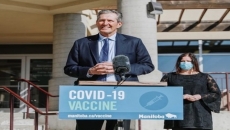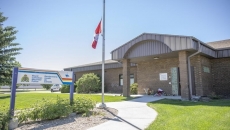Parliamentarians are entering what could be their final stretch in the House of Commons before summer break as the Liberal government sharpens its focus on two key pieces of legislation.
On the agenda are the Liberals' proposed ban on conversion therapy and a law that would track Canada's progress on reaching net-zero greenhouse gas emissions by 2050.
Given the minority government, the possibility of a general election at any time hangs over the House of Commons -- autumn marks two years since the Liberals eked out their win.
Members of Parliament not seeking re-election recently delivered farewell speeches as the parties brace for a potential fall vote, which may also be driving some partisan finger-pointing.
Prime Minister Justin Trudeau used his government's latest briefing on the COVID-19 pandemic to blame the Opposition Conservatives for blocking passage of its conversion therapy and net-zero bills.
Some Conservative MPs have raised concerns about the Liberals' definition of conversion therapy, which aims to change someone's LGBTQ identity.
They say they don't support the coercive practice, but worry the government's definition is too broad and could threaten individual conversations about sex and gender issues, particularly between adults and children.
Conservatives, along with Green Party MP Elizabeth May, have also raised concerns over the speed at which the Liberals, with the help of federal New Democrats, are trying to get a proposed climate accountability law passed through the House of Commons.
Parliament will also focus today on the next steps for Public Health Agency of Canada President Iain Stewart, who has come under fire for refusing to release unredacted documents about the firing of two scientists at Winnipeg's National Microbiology Laboratory.
The Conservatives have spent months pressing the government for answers on why Xiangguo Qiu and her husband, Keding Cheng, were escorted from the site nearly two years ago and later fired for "policy breaches."
The party cites national security concerns involving China.
In addition to seeking unredacted documents related to their termination, a parliamentary committee studying the matter wanted files on why viruses, and other materials from the high security lab, were shipped to the Wuhan Institute of Virology.
Opposition parties passed a motion finding Stewart in contempt of Parliament for failing to release the documents and summoning him to appear Monday before the bar of the Commons to be reprimanded by the Speaker and to hand over the unredacted information.
"This issue is rapidly evolving into a second, much more serious issue," Conservative foreign affairs critic Michael Chong said of the initial firings.
"The government is seriously getting close to crossing a line of deliberately undermining the rule of law … these orders of the House, they're not optional to follow."
Last week, Stewart told MPs on a parliamentary health committee that the House order doesn't excuse him from his job of protecting privacy and national security interests.






